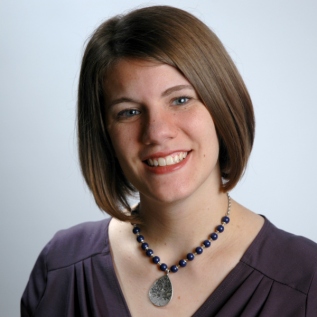Evangelical blogger and author Rachel Held Evans is no longer evangelical; she has joined the Episcopalian church which, in the US, is not very theologically conservative but rather progressive or liberal. This isn’t very surprising since Evans has been very critical to evangelical theology as well as evangelical views on politics, women, the LGBT community etc.
In an interview that has been published in several media, including Sojourners, Evans names these progressive values along with sacramental church life as being the reason she joined Episcopalianism. She’s also asked to comment the fact that the Episcopalian church is rapidly losing church attendees, to which she responds:
Just about every denomination in the American church — including many evangelical denominations — is seeing a decline in numbers, so if it’s a competition, then we’re all losing, just at different rates… Lately I’ve been wondering if a little death and resurrection is exactly what the American church needs… A church might produce thousands of attendees without producing any disciples.
This is quite remarkable, since the point of one of Evans’ most famous articles on CNN’s Belief Blog is that evangelical churches must become more liberal to stop millenials from leaving them. This is a similar argument to John Shelby Spong‘s famous thesis that Christianity must change or die. A former bishop in Evans’ new church, Spong argued that this change includes stop believing in theism, stop beliving in the supernatural, stop believing that prayer is useful and stop believing in physical resurrection. Pretty ridiculous. Evans is far from this extreme, but her reasoning in the CNN article was similar: liberal Christianity is necessary for church growth.
I remember how provoked I was by Evans’ article when I first saw it in 2013, partly because I (unlike Evans) am a millenial and I have no interest in embracing liberal theology, but also because I know that liberal churches like the Episcopalian church in the US or the Lutheran church here in Sweden, are declining like crazy. To present liberal theology as the answer to evangelical decline is both non-biblical and non-empirical.
Since the day I was saved I’ve based my faith in Jesus on the New Testament. There I read that Christ is the only way to God, that He was born of a virgin, that He performed miracles, that He assigned His disciples to heal the sick in His Name, to preach the Gospel always, to love their enemies, to erdicate poverty and to embrace holiness, teaching that life is sacred, that men shouldn’t have sex with each other, that personal wealth is wrong and that God’s people shouldn’t adapt to the standards of this world but be renewed by the Holy Spirit.
Now, this crosses the traditional lines between left and right. Evans criticizes how evangelicals support war, economic inequality and a judging mentality, and rightly so. A conservative Christian like Chelsen Vicari criticizes how progressive Christians downplay doctrine and opens up for heresy, doubts the miraculous and decreases incentives for evangelism, and rightly so. Is it just me who thinks that Biblical Christianity reject the bad stuff in both of these camps while preserving the good?
Christianity is growing massively in the majority world (Africa, Asia and Latin America), especially Pentecostal and charismatic churches. Liberal theology is largely a Western middle-class phenomena and it has absolutely nothing to do with church growth. Yet, even many Pentecostal and charismatic churches are decreasing in the US – as Evans says, all denominations are losing at different rates. How come?
Well, church growth is not just dependent on what doctrine you have but also on whether you evangelize or not. In the Majority World, evangelism is very common both as organized church events as well as spontanious actions in the daily life of Christians. In the West, it is very uncommon that the whole church leaves (or sells) the building to go out and share the Gospel together, and this builds a culture where Western Christians do not evangelize as often as Christians in the Majority World. Or the Bible.
As I’ve argued in a previous post, I think all churches should go back to the Biblical Jerusalem church structure where everyone participated in daily evangelism. This of course presupposes that the church believes in the Gospel and that evangelism is necessary. For the evangelism to be effective, it should be confirmed by miracles (Acts 14:3) as well as expressed in both words and deeds (Rom 15:18-19). Thus, charismatic activism combined with daily evangelism is a Biblical recipy that Western churches really should try out.
This means that Conservatives should be more passionate about peace and justice, liberals should be more passionate about miracles and the Gospel, and everyone should be more passionate about daily evangelism. Yet, Evans words about making disciples rather than attendees should be remembered – church growth isn’t necessarily a sign of Biblical Christianity, as the Mormon movement tells us for example. Still, if a church leads no one to Christ, they’re doing something wrong. And it could be as simple as the fact that they aren’t telling strangers about Him.










To fairly represent Rachel’s views, she does not cite liberal theology, but the historic sacraments as her motivation. She is very aware that others leave the sacramental churches for evangelical ones.
“But I know plenty of folks who were raised as Episcopalians who have become evangelical, drawn by the exciting and energetic worship or the emphasis on personal testimony and connection to Scripture. It’s common in young adulthood, I think, to seek out faith traditions that complement the one in which you were raised. It’s not about rejecting your background, just about finding your own way. I don’t want to project my experience onto all millennials.”
Fortunately in England being theologically conservative does not equate with political conservatism. Nor is the Church of England a liberal paradise as you suggest ECUSA is. You can have a mix of sacramentalism and evangelicalism combined. Even the Archbishop of Canterbury is evangelical.
C.S. Lewis, N.T. Wright, Stott, Packer, Scott Mknight David Neff, are all Anglican/ Episcopalians and you represent the group with Spong?!?!
Hello Josh!
I was talking about the Episcopalian church in the US, and as far a I can see none of those you mention are a part of that church. Of course Spong is extreme, but it is no secret that the American Episcopalian church is very liberal – he didn’t become a bishop by accident.
Blessings!
Hi Michael, I don’t fully agree with you here either, though I don’t fully disagree.
I think there are many more factors and nuances than you could cover in a short blog post. As Josh implies, there aren’t just two theological positions – evangelical or liberal, but many. I think the Holy Spirit may be bringing many changes, and some of the things that you think are “liberal” may be on his agenda (though not others), and the church of the future will look like a mix of many of the labels. THat broadly is what you conclude too, but I think we would disagree about some of the details. Time will tell!
Also, doing evangelism in the first world isn’t always the same as doing it in the majority world. People in once-christian countries such as in Europe are often jaded with religion, think they know all about christianity and reject what they think they know, whereas people in majority world countries often find christianity quite new and exciting. So our methods should reflect that difference – for example, in majority world countries a simple announcement of the good news may be sufficient, with healing and welfare supporting, but in first world countries we may need loving christian communities doing good in the local community plus some apologetics before we’ll get a hearing with many people.
But I still agree with you that we should be open to Holy Spirit healing and radical living together.
Evans is actually extremely orthodox and conservative when it comes down to it. It isn’t fair to compare her to Spong.
I really wish Rachel (and everyone disenchanted with modern evangelicalism and concerned with both a deeply pastoral issues but also with truth) would read Pope Francis’ “Evangelii Gaudium” (The Joy of the Gospel), as well as John Paul II letter in 1995 “Letter to Women For Beijing Conference”. It pains me how much the Episcopal Church has compromised on almost every key issue (especially abortion) that seems to be undermining the family. The Anglican/Episcopal Church is deeply divided. Perhaps she will also consider reading the work of one famous, former Anglican: John Henry Newman.
oh please.